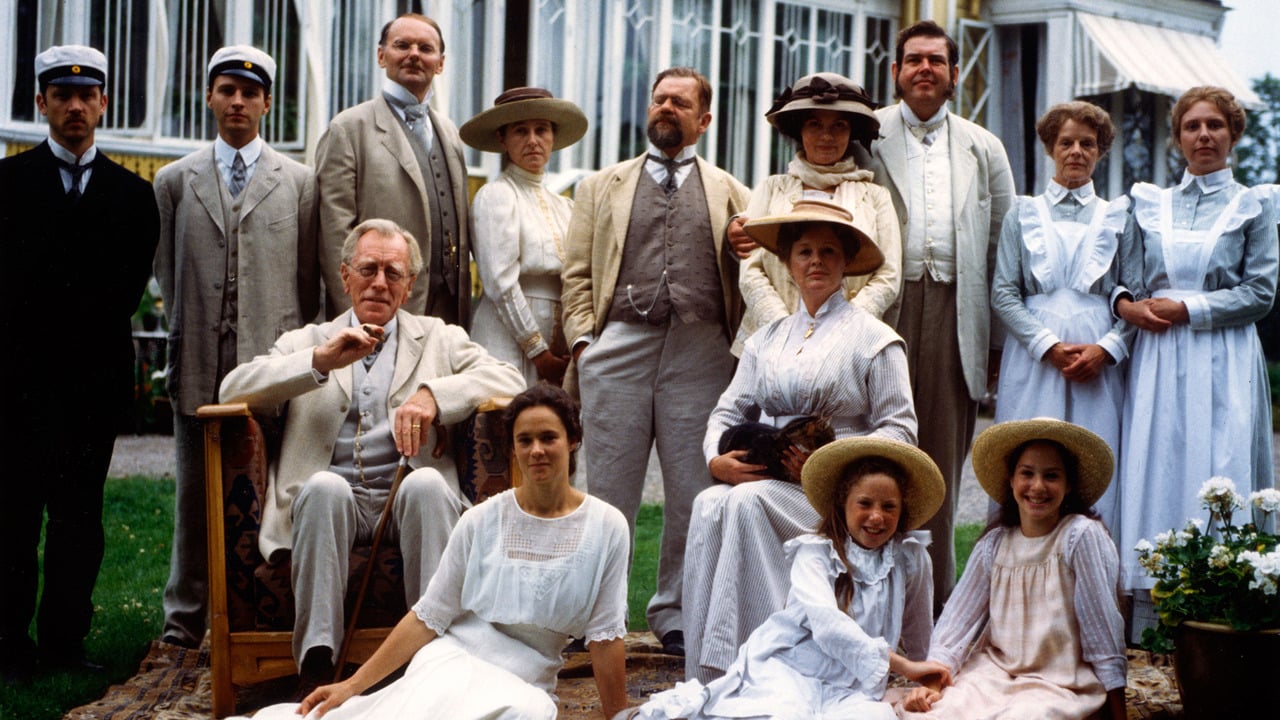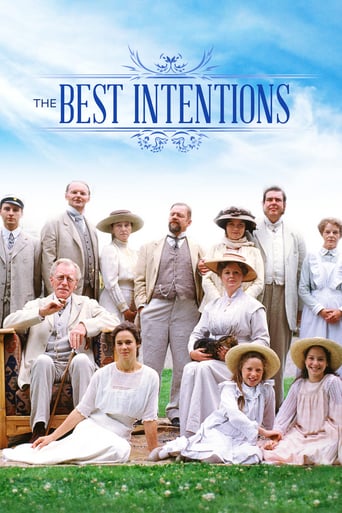LastingAware
The greatest movie ever!
Boobirt
Stylish but barely mediocre overall
Exoticalot
People are voting emotionally.
Marketic
It's no definitive masterpiece but it's damn close.
Vonia
The Best Intentions (Swedish: Den goda viljan) (1992)
Director: Bille August
Watched: 7/11/18
Rating: 7/10 For parents' story,
Bergman hands over the reins;
Finds lavish funding. Deft performances,
But tedious fights/trite scenes.
Haunting score/soundtrack. Her mother's rebuke.
Class struggle, religious woes.
Love's perseverance. Swedish beauty/Nordic gloom;
Lengthy but quite affecting. Haiku Sonnets are comprised of 4 3-line haiku plus a couplet of either 5 or 7 syllables, adding up to 14 lines, the same number of lines found in a sonnet. (5-7-5, 5-7-5, 5-7-5, 5-7-5, 7-7/5-5)
#HaikuSonnet #PoemReview #BasedonaTrueStory #ClassStruggle #Danish #PalmedOr #Swedish
David Land
I saw this film soon after it came out back in the 1990s. I had never seen a Bergman film, and it was by fate that I saw this one, the result of a hastily made decision to see another film when the one we had intended to see was sold out at the Innwood in Dallas Texas. I don't even recall what we had gone to see. Once inside, we found out it had subtitles, much to my consternation. Little did I know that I was going to possess one of my favorite films of all time.Some have suggested that the title Best Intentions automatically implies that there will be disappointment. I couldn't disagree more. Perhaps it is because I grew up hearing this phrase 'good intentions' all of my life, indicative of some failures but not wholly lost or irredeemable. For this film, I entered with no prejudice, not knowing anything about it or its writer/director.It is the story of two lovers in northern Sweden in the early 1900s. Henrik Bergman, a poor theology student who was befriended by Ernst Akerblom, was invited to dinner with the large family of Akerbloms. He is late and almost, but for the insistence of Anna, turns around to leave in embarrassment. She encouraged him to come in and he reluctantly obeys. Anna introduces him to the family one by one and he is seated to table for dinner. His discomfort is apparent as he, at first, began to tuck his napkin into his shirt collar, but notices everyone else keeping theirs in their laps. The family engages him in polite conversation, being quite welcoming in all. This is the first meeting of Anna Akerblom and Henrik Bergman, who would find love together.Best intentions proliferate in the saga: Henrik is conflicted about his obligation to Frida. Anna's mother, Karin, dislikes Henrick and tries to prevent her daughter from pursuing this love. bAnna becomes ill with tuberculosis and goes to a sanitorium, but she never forgets Henrik. When she recovers Anna's mother takes her on a trip to Italy, thinking that she will forget Henrik. She even intercepts, reads and disposes of a letter Anna writes to Henrik, against her husband's advice. After weeks of being away, Anna longs for home, and for Henrik. A telegram arrives and announces to Karin, that her husband, Johan, Anna's father has died. In her grief Karin reveals to her daughter that she had taken the letter to Henrik and burned it and begs her forgiveness. Yet we know that she had good intentions for her daughter, even though she had hurt her deeply.During the separation of Henrik and Anna, he becomes depressed misses Anna. Frida, proves a rare wise woman, knowing that Henrik loves Anna and will never be happy without her, meets secretly with Anna to implore her to rescue Ernst by taking him back. Finally, the lovers, together again, visit the small parish that Henrik is being called to serve as minister. Anna is not deterred when she sees the state of quarters this church offers as the parsonage, in disrepair and inadequate. Together, she and Henrik visit the abandoned looking chapel where Henrik will preach, when it suddenly occurs to him that they could be married here, instead of the big wedding Anna had already planned. Anna objects, almost insulted that her fiancee would suggest such a thing and their worst argument ever ensues. They both say terrible things they quickly regret. Henrik realizes his error, and agrees once more to the wedding Anna had planned.The remainder of the film continues to support the title. I highly recommend this film!
MisterWhiplash
It's always kind of staggering to think of other films that deal with love and marriage and the twisted ties that bind when compared to what Ingmar Bergman does in his scripts. Stripped away from the problems that come with such dangerous clichés like the old mother forbidding her daughter from being together with a man she just does not like, or with the marriage being strained by outside influences. Maybe the latter isn't much of a cliché as it might be a convention, but it's all dealt with by Bergman in his story of Henrik Bergman and Anna Bergman with complete, un-filtered honesty, even in the harsher moments. While it's not actually one of his very best scripts, with a couple of flaws here and there and it not being quite long enough (i.e. Scenes From a Marriage and Fanny & Alexander being five hours each), it has more emotionally shattering moments, and even under-stated ones, that would make most other dramas about a relationship in trouble meek in comparison.That being said, it's also not technically a Bergman film, but directed through Billie August with maybe a slightly differed sensibility. Yet it's not by that much, aside from specific choices in the music (I don't think Bergman would have used the musical accompaniment, not that it's bad but it tells of what is usually different and less frequent for the material), and because of the nature of the material and the characters, it's not surprising if the Best Intentions feels more like a Bergman film than August. The rhythm of the acting, too, feels like it still is out of those vintage masterpieces of the 60s and 70s. Here we're given the story of how Henrik (Samuel Froler) and Anna (Pernilla August) came to be husband and wife. It's basically in two halves- the first dealing with Karin Akerblom (Ghita Nørby), Anna's mother, and her dire attempts to keep the two away from one another. And at first Anna agrees, but soon the attachment to one another can't be broken, even through an early affair Henrik has with a waitress and Anna's tuberculosis scare. Many specific scenes, like a very harsh (though always under the surface) scene between Karin and Henrik, when she tells him point blank to leave and never come back to see Anna, or when Anna is told after the death of her father Johan (Max Von Sydow, always great to see him even in limited time) about how she destroyed a letter she found that she meant to sent to Henrik. So much of this is so powerful for how all of the dialog, all of the little notes and emotion in the action penetrate to the core elements of the drama. Sometimes I felt like I was seeing even deeper truths being reached about parents and children (not only Anna with her mother but Henrik with his family- both have tarnished relationships, but however much forgiveness is left off or ties severed shows also how the children become as they are), and a take on the free will vs. determinism of such a decision. So all of this is always fascinating, seeing this 'version' of Bergman's parents and their struggles to be together- Henrik the sort of cold yet compassionate loner parish/priest, and Anna the very warm and heartfelt soon-to-be-mother- as they both have head-strong tendencies. I can't say how much of what unfolds in the 2nd act holds up as being totally true to what Bergman's parents lives were, but then who could? It's all made for dramatic sake, anyway, but what ends up sticking most is the friction in their marriage early on, when they move away to a small, working-class village where Henrik wants to work as the village pastor. It's in this section that the flaws arise, but not big ones, only enough to keep it odd yet intriguing. Like the character of Petrus, who is a weird little trouble-maker who is too sickly and frustrated to live with his parents, so Henrik and Anna take him in, which turns out disastrously. But there needs to be either more context with this character (and, indeed, a version of this film- a mini-series for Swedish TV- is double the length), or nothing at all, as everything that needs to be said about the strife in the two of them is actually there in the sub-plot with the angered villager Nordenson. And with the ending, it's satisfying, in a catharsis way though it's not as great, or even perfect, an ending it could have been had a certain decision been made on Henrik's part when he sees Anna outside.I won't mention what, but it doesn't matter at any rate. What makes The Best Intentions a gem in the Bergman cannon is his trust in the audience to take these 'characters' as full-on human beings, who have the utmost trouble with one thing, compromise and the real meaning of love for one another- connection, which is what Bergman goes for in most of his films. And helping this greatly are the main actors, who elevate an argument mid-way through (regarding the location of the wedding) to the powerful terrain it's reaching for. August fits the requirements of her character just as Froler does, even if Froler ends up being slightly more constricted due to the nature of his own self-restrictive and hard-pressed priest. In the end, The Best Intentions makes wonderful use of autobiography for the stuff of an often gut-wrenching romantic drama where the personal goes into the theatrical, and the direction and acting brings out the best in Bergman's voice in his golden-age.
MartinHafer
Having seen at least a couple dozen Bergman films, this biographical movie made a lot more sense to me than if I hadn't. I could see bits and pieces of his other films, particularly parallels with Fanny and Alexander. This movie was written by but not directed by Ingmar Bergman and tells about a portion of his father and mother's lives (with particular focus on the father). However, unlike the cruel and over-zealous preacher from Fanny and Alexander, Bergman's father is a flawed man full of dichotomies. A very pious and severe man with little sense of humor, he also apparently has no problem with premarital sex (with two different women) and is an advocate for the working poor. I think these inconsistencies and his father's difficulty with expressing normal human emotions lead to Bergman's earlier works (such as the professor in Wild Strawberries and the persistent theme of living in the barren wilds in movies such as The Passion of Anna and Shame).So, why didn't I score the movie higher? Well despite the insights, the movie was very long and occasionally tedious--particularly for the Bergman novices. Plus, although the movie gave us some insights, the actual span of time covered in the film was rather limited. It was like a glimpse but an incomplete glimpse of the man.

